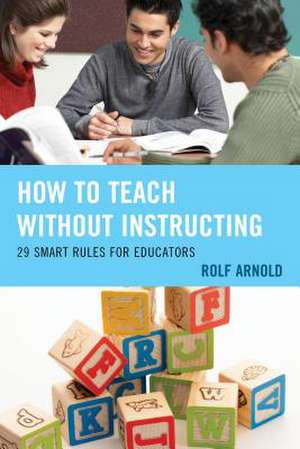How to Teach Without Instructing
Autor Rolf Arnolden Limba Engleză Hardback – 8 iun 2015
Preț: 543.25 lei
Preț vechi: 705.52 lei
-23% Nou
Puncte Express: 815
Preț estimativ în valută:
104.04€ • 107.19$ • 87.16£
104.04€ • 107.19$ • 87.16£
Carte tipărită la comandă
Livrare economică 22 februarie-08 martie
Preluare comenzi: 021 569.72.76
Specificații
ISBN-13: 9781475817751
ISBN-10: 1475817754
Pagini: 194
Ilustrații: 20 black & white illustrations, 31 tables
Dimensiuni: 157 x 231 x 20 mm
Greutate: 0.45 kg
Editura: Rowman & Littlefield
ISBN-10: 1475817754
Pagini: 194
Ilustrații: 20 black & white illustrations, 31 tables
Dimensiuni: 157 x 231 x 20 mm
Greutate: 0.45 kg
Editura: Rowman & Littlefield
Notă biografică
By Rolf Arnold
Cuprins
CONTENTS
Author¿s Introduction:
Teaching and Learning: Two Sides of the Same Coin
Rules for Smart Teaching
Rule 1: Examine your own learning theory! I learned it somewhere else. ¿We are all capable, but are often just out of practice.¿
Rule 2: Support the competence competence of the learner!
Rule 3: Strengthen the learner¿s self-learner skills! If you see that something is not working, let it be! What to do?
Rule 4: Base the learning content on the learner¿s experience!
Rule 5: Focus your teaching on developing talent! Reinvent the learner! How to avoid learning goals, yet still be effective
Rule 6: Exercise situational and reflective educational activities! Preparation of the second order
Rule 7: Relate your teaching activity to skill profiles! ¿Portfolio, therefore I am?¿
Rule 8: Try to create individual learning scenarios!
Rule 9: Promote self-paced eLearning by your students!
Rule 10: Practice triumvirate rule as you select, prepare, and deliver!
Rule 11: Stage the learning process to be an effective experience!
Rule 12: Follow the criteria for vibrant and long lasting learning!
Rule 13: Learn how to ¿teach in stereo!¿
Rule 14: Train your sense of appreciation!
Rule 15: Provide the framework and building materials for the learners¿ learning projects!
Rule 16: Apply the concept of learning by doing!
Rule 17: Be devoted to your own personality development! Teachers as mentors A cure for educational narcissism
Rule 18: Surprise the students by using imaginative methods! On the gradual disappearance of mediated learning
Rule 19: Expand your repertoire of methods!
Rule 20: Review your own teaching style!
Rule 21: Develop a preference for ¿open mediä developed with the students! Media should become a form of student expression!
Rule 22: Free yourself from hasty typifications! The differences in learning behaviors have been widely studied. Avoid learning types: ¿All inclusive¿ didactics!
Rule 23: Practice dealing with classroom interruptions/distractions!
Rule 24: Let outcomes guide your teaching activities!
Rule 25: Follow the didactic debate! Didactic professionalism Didactics - the science of professional teaching
Rule 26: Develop and use various forms of professional testing!
Rule 27: Increase the feedback opportunities available to your users!
Rule 28: Participate in the organizational and team development!
Rule 29: Plan your own professional competency development!
Afterword: Thoughts on the patent fears of teachers and educational theorists
Descriere
How to Teach Without Instructing relinks teaching and learning. It examines the teaching practices in institutions of learning and formulates "rules" that assist teachers in their efforts to focus their teaching on the learner. The rules are based on situations that are routinely encountered in the teaching environment.
